
USA Falcons’ Lawson scoring in the LAI 7s final / Photo: Alex Ho (hoiho.net)
Today, Kayla Lawson is a USA 7s resident and recent USA Falcons debutant, but three years ago, her world had been devastated. A sprinter for DII NCAA and nationally ranked Chico State, she blew her hip out just as her senior season was about to begin. She had done everything right in terms of caring for her body, and it cruelly betrayed her. It was a low point, but the injury that took Lawson away from the track served as a pivot into rugby.
“Rugby helped me feel whole again,” Lawson said. “Looking back, I’m glad [the injury] happened, but during the incident, it was really terrible. That was 10 years of work I had lost. I believe this is the sport I was supposed to be in, but I’ll always be grateful to track. If I didn’t have my speed, then I wouldn’t have climbed the [rugby] ranks this quickly.”
Lawson knew rugby from childhood. Her grandfather, Ian Botha, played for South Africa, and they watched games together and talked about the sport throughout her youth, but she never played. Instead she liked basketball and lacrosse, and developed a healthy sense of competition as the only girl cousin in a sport-aligned family. In high school, Lawson focused on track & field and cross country, and running became her obsession. She received a scholarship to Chico State and ran the 200- and 400 meter for the Wildcats.
“That was my life. It also paid for my college, my degree, and I have a master’s [in sports management] now because of it,” Lawson said of track. “But looking back, I wonder if I actually loved track or was it because I was good at it?”

Lawson explained that sprinters need to be at least 95% healthy for race day, so that means an attentive, responsive relationship with one’s body. If a hamstring triggers, there’s no pushing through or testing. One dials back, recovers, rehabs – whatever is necessary to keep that finely tuned machine in top-performance shape. Lawson abided, and then blew out her hip senior year.
“It’s really weird because first it feels like you pulled a muscle,” Lawson described the injury. “But after a day or two, I couldn’t sit, stand or move my leg it was so painful. Ask anyone who’s had hip surgery or tore anything in their hip, and they’ll say it’s excruciating, because there are so many nerves through your hip and into your lower back. The worst part was they thought I had a lower-back injury, that I pulled something in my glute, but couldn’t figure out the problem for months. I got [Electromyography tests] and painful nerve testing and imaging, then an arthrogram, which injects dye into your hip, and that’s when they saw my hip was all torn up.”
Lawson needed surgery but balked at the doctors who recommended breaking her hip and rehabbing in a wheelchair for three months. She finally found a surgeon who first considered a less aggressive approach, and after successful surgery, Lawson was on a bike in 24 hours.
“I had to learn how to walk and run again, but that wasn’t until six weeks after surgery,” Lawson said. “I wasn’t running full speed until 7-8 months afterward. It’s more about trusting your body again because it felt like it failed me.”

Lawson knew her track career was over, that it would take years to regain the speed she used to have, but that despair eased with the prospect of a new, enticing challenge. In the past, the San Diego native had trained at the Chula Vista Elite Athlete Training Center (CVEATC) with track coaches Tonie Campbell and Jeremy Fischer. That’s where she met speed coach Les Spellman, who was training 800m athletes and has worked with USA Rugby and notable Eagles like Perry Baker. He’s an advocate for the sport, but it wasn’t until Lawson’s injury that he really pushed for her transition to rugby.
But it wasn’t just a, “Hey, you’re fast. You should play 7s,” scenario. Spellman trained NFL combines, and one day just messing around, Lawson jumped on the field. The quarterback threw a bomb, and Lawson ran a crazy route and burned a defensive back to complete the pass. Lawson noted that track & field athletes aren’t necessarily known for their hand-eye coordination or tracking abilities, but her sporting history developed those skills early in life.
“He told me, ‘You should play rugby with the San Diego Surfers. The coaches are great and that’s how you’re going to get seen for the national team,’” Lawson said of Spellman’s encouragement. “He was like, ‘Here’s Josie [Ziluca’s] number. This is when the season starts.’ He really pushed me.”
Lawson worked with an S&C coach to regain some of her lost muscle, and in February 2019, she played her first 7s game and tournament at the Las Vegas Invitational with a motley Scion/Samurai Rogues squad. It was a baptism by fire, and Lawson was intimidated, but she was also grateful to the welcoming reception of Joanne Liu, who added the first-timer sight unseen. Sevens pre-season for the San Diego Surfers began soon afterward.
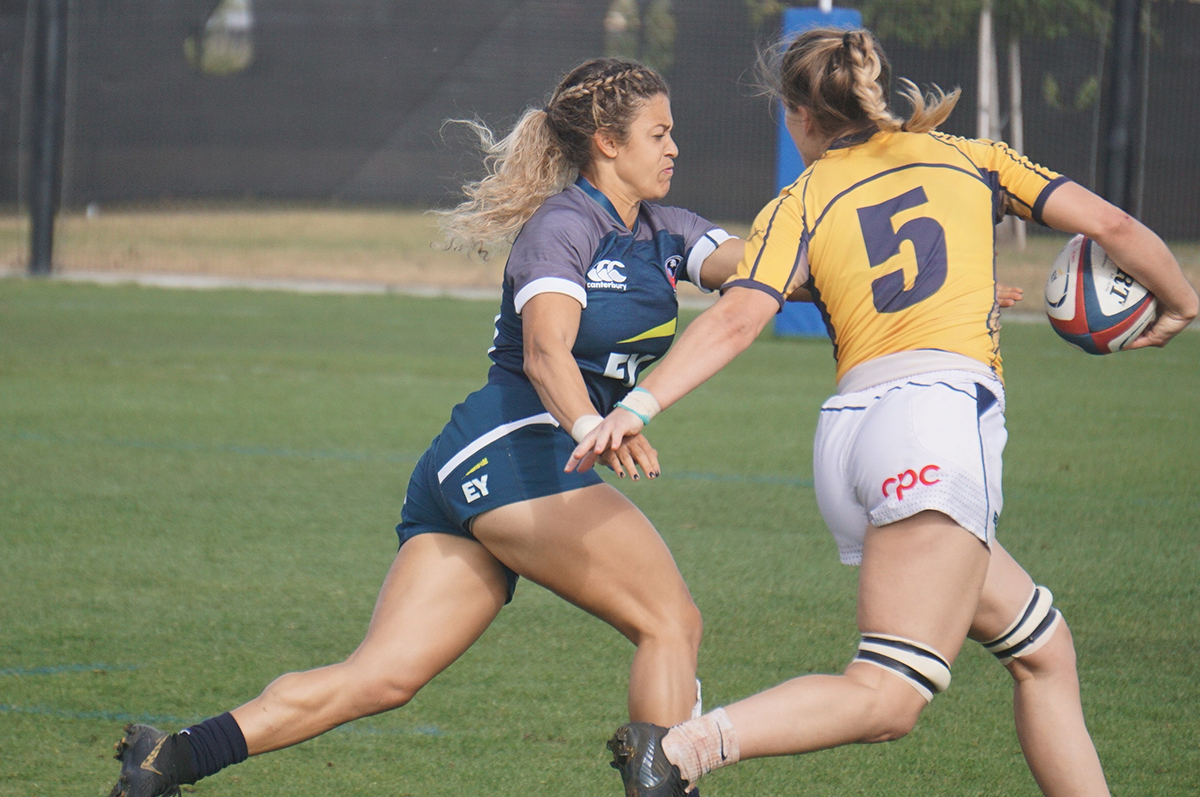
“The coaches are amazing,” Lawson said of Surfers 7s coaches Michaela Staniford and Kate Zackary. “Their processes and things like that alone are amazing that they could have made this [transformation] happen with any type of player. And we also have so many amazing players on our team that also helped me get up to speed.”
Players like Alena Olsen and Teigan MacDonald, who featured on the USA Falcons team with Lawson last weekend, were among the teammates who aided her rugby education.
“They never yelled at me or were upset with me because I didn’t understand something. They took time to help me develop,” Lawson continued. “It was a good environment because you have people who are more cut-throat and helped me to perform under pressure, but there also those who were understanding and not as tough on me. It’s a good balance.”
Every Tuesday and Thursday, Staniford led 5:45 a.m. conditioning workouts at Clay Park.
“They were insane and more painful than track, but we were so fit,” Lawson said. “We were playing full games and not tired. They know how to program that side of the game.
“The coaches are really good at getting the best out of players,” she added. “You always hear, ‘You’re track & field, you’re so fragile, you’re always saying everything hurts.’ Mich really saw my potential and helped me reach it.”
Lawson’s relationship with her body began to change, and it’s an adjustment with which she deals daily.
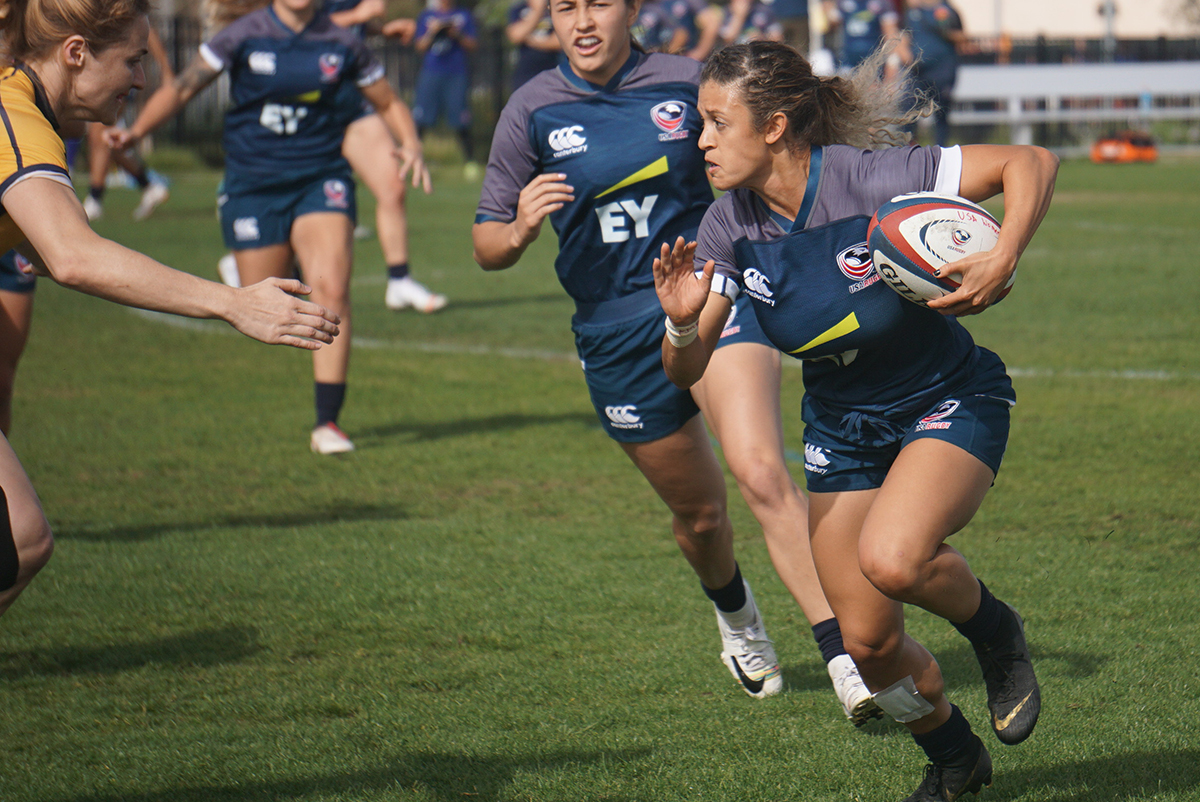
“In rugby you have broken fingers – my hip flexors pulled this weekend – and you keep playing,” Lawson contrasted the track & field relationship with injuries. “So, many things I’ve noticed are my body kind of freaking out during the transition. But it’s taking it one step at a time and every time I get an injury I try to rehab it. It’s mostly just being sore all of the time.”
Lawson played summer 7s with the Surfers and made the squad for the 2019 USA Rugby Club 7s National Championship to Kansas City, Mo. Everything was lining up, except one aspect: support in her professional career. Lawson has a sports management masters and was fully employed, but her company regarded her rugby exploits as a hobby. When she requested two days off for nationals and laid out a plan for how she could work remotely during that time, her company was not supportive.
“I talked to my family and they said, ‘Quit that job. Go to nationals. Do what you’re supposed to do and hope that gets you to the Center,’” Lawson said. “I’m usually so calculated in everything I do, and I don’t like taking risks like that. I also don’t like to quit things and let people down, so that was a hard conversation with the CEO.”
The gamble paid off, as San Diego won its fourth national title, and Lawson distinguished herself on the pitch.
RELATED: MVP MacDonald Recounts Surfers’ Title Run
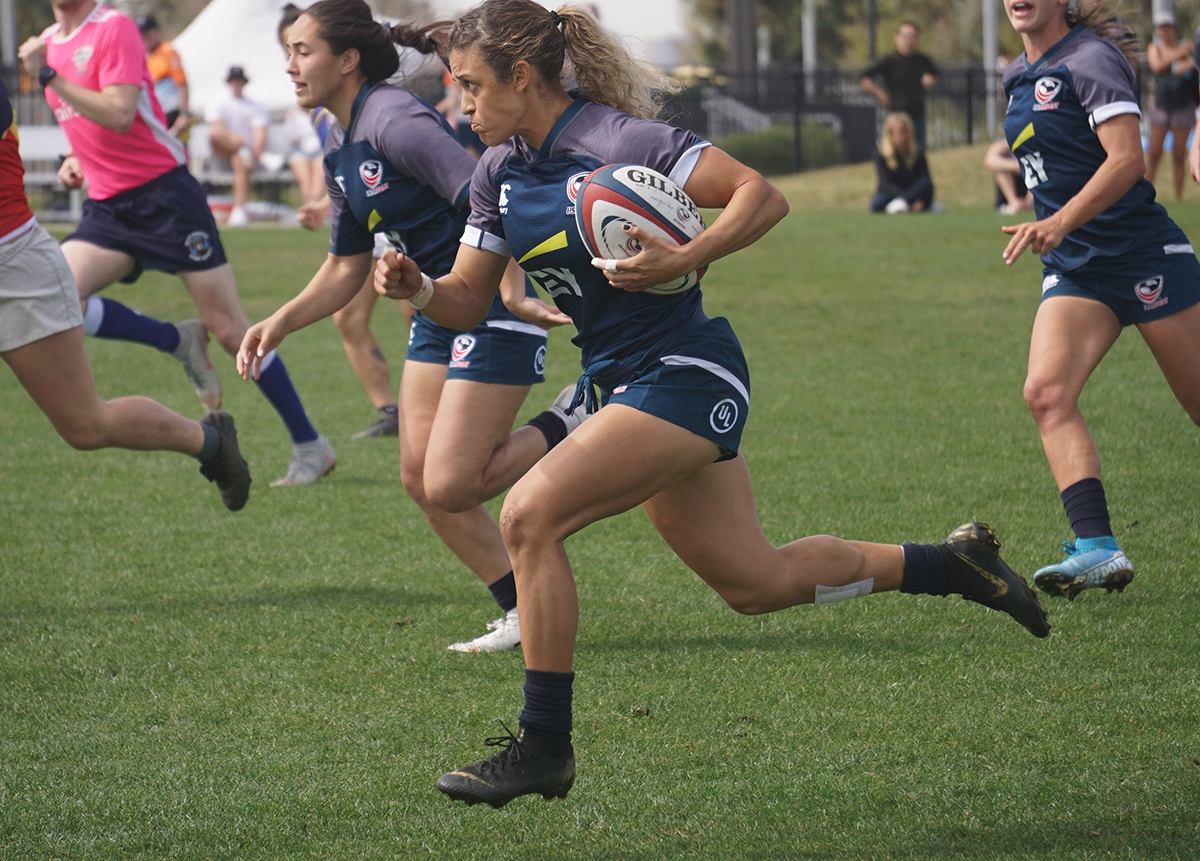
“That’s when everything started to pick up,” Lawson said. “It’s one thing to be fast, and speed is very important; it’s another thing to play defense and tackle and chase people down. I might have been on some radars before nationals but that is what really opened up people’s eyes to the type of player I am, even though I’d only been playing for 3-4 months.”
After nationals in mid-August, Lawson was invited to a camp at the CVEATC to play on the remote team, which plays the USA 7s home team once a month and can be a vehicle into residency. She had some time before the assembly and linked up with South African skills coach Charlie Purdon. Lawson learned of the coach through – you guessed it – Spellman, who made the introduction.
“He said, ‘Are you free tomorrow? Then we’ll start immediately,’” Lawson recounted her first interaction with Purdon. “He’s a really big factor in why I’m here. He fixed my pass, he taught me so many technical things – ground work and kicking and receiving kickoffs and offloads – everything you can think of. He even had me doing scrumhalf passes and playmaking things. He got me really ready for camp and upped my game.”
Lawson met with Purdon 3-4 times per week, and the work paid off. She performed well at camp.
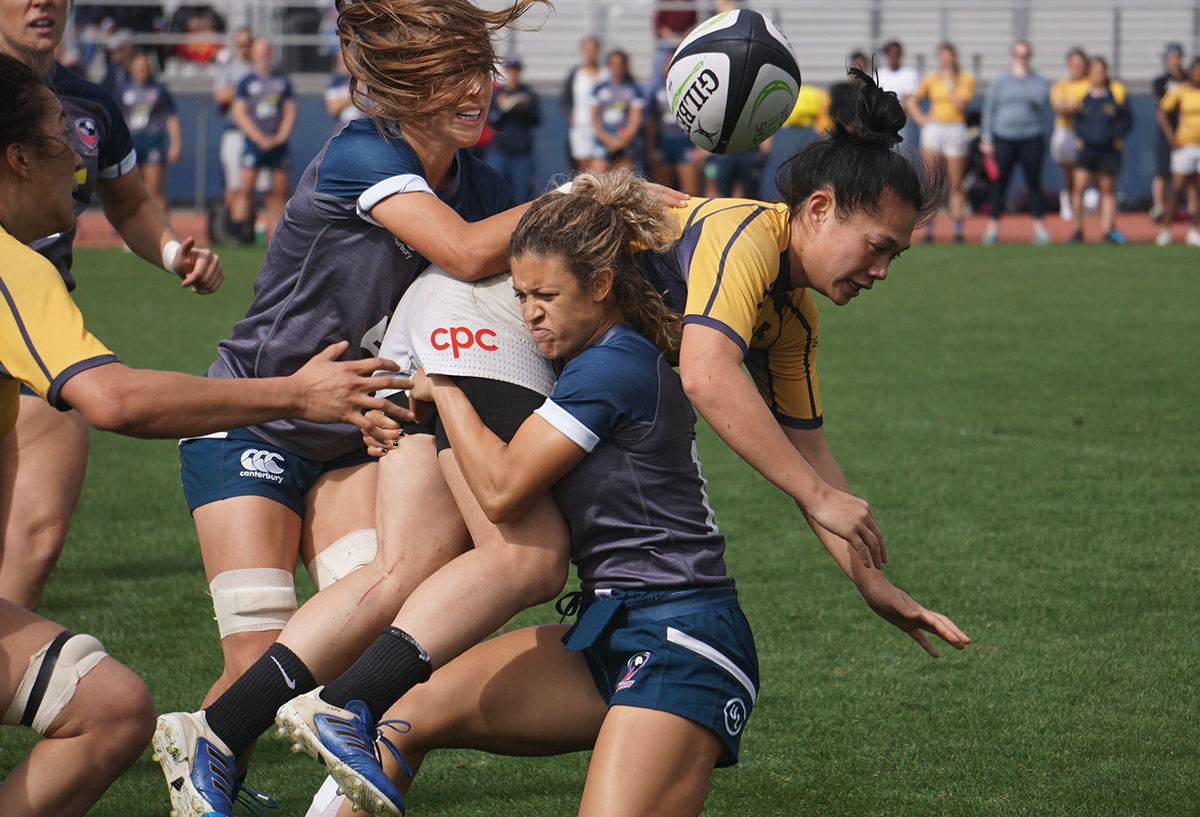
“We had our 1-to-1 meeting at the end of the week, and they said, ‘We want you here starting Monday, starting now,’” Lawson said. “I was completely blown back and immediately started crying. This is all I ever wanted to be – an athlete – and to want something so badly and getting it so quickly was so great.”
Lawson put herself in a position where she could say, “Yes,” immediately and became a USA 7s resident at the end of September, when the home team was in Colorado for the Glendale 7s. She was the only one added, as the new cycle had started in August and new players were already assimilating.
“The coaches are very transparent and it’s something our program is very big on with athletes and coaching staff and all that. ‘This is what see for you and what you can become,’” Lawson said. “It was tough coming in to such a high level of rugby, but there’s no way I’d learn this much if I wasn’t at the Center. This is the only place where I could develop this quickly and learn the correct processes and not develop any bad habits.”
Lawson was particularly struck by her teammates’ commitment to the team. Everyone answered questions, offered tips or extra film sessions, all while competing for positions. The team benefits when the next-person-up is ready to perform, and it was an ethos that Lawson didn’t necessarily experience in track & field.
Lawson focused on improving her contact skills, making efficient tackles that set up opportunities for poaches and keep the defense connected. She got her opportunity to test her growth against different opposition during last week’s Los Angeles Invitational (LAI) 7s. As a member of the USA Falcons, the representative team competed in the Women Elite 7s bracket against senior women’s clubs, touring sides and one college.
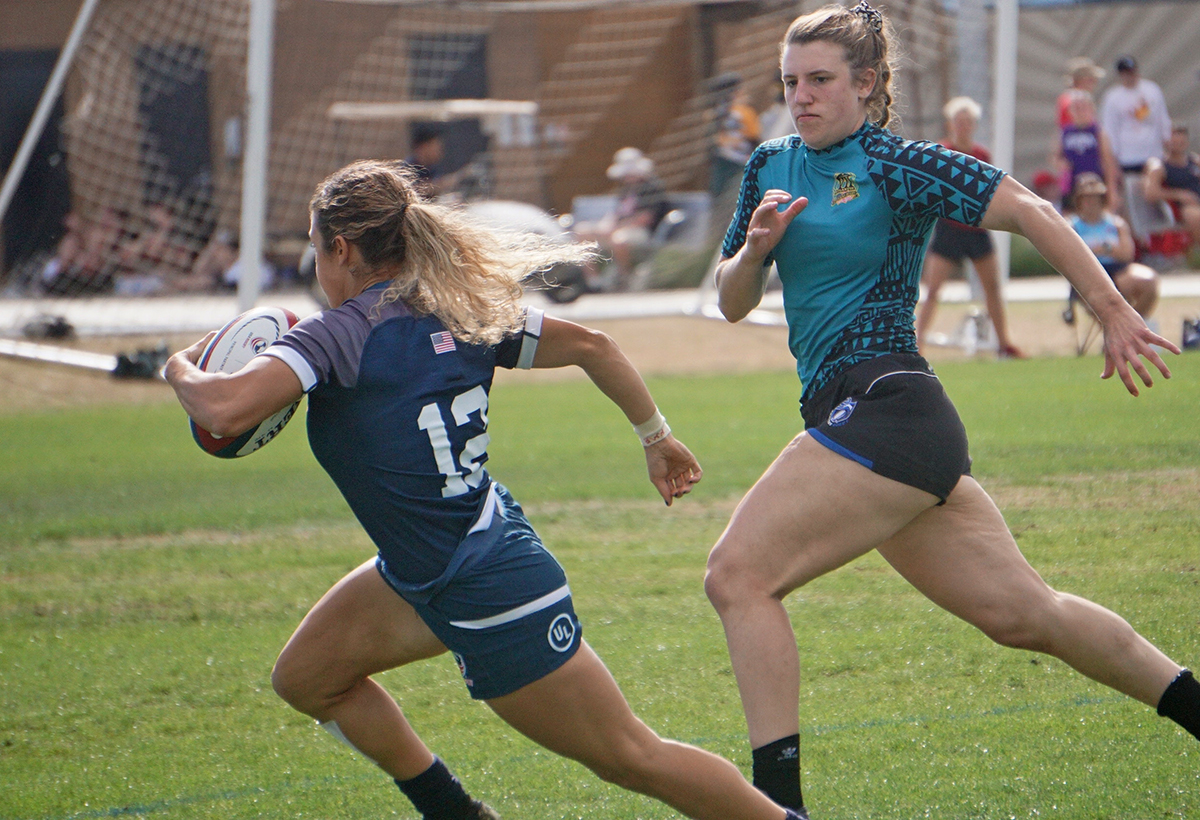
“The first game was really freaking tough. There were a lot of tackles and physicality,” Lawson said of the opening 22-10 win against Berkeley, the 2019 Club 7s National Championship runner-up. “ORSU was different; they had some really heavy ballcarriers. But it was the Atlantis game where we really were well oiled. Things were turning around and working, and we were having fun.”
The Falcons beat ORSU 36-10 and Atlantis 27-12 on day one.
“We always talk about sticking to our processes. If they’re lining up really narrow, that’s not how we’re going to line up. We want to force them to where we want to go on attack,” Lawson said of team focus. “We had to make sure that we were really disciplined. Day one we had lots of penalties and missed opportunities, and that was something coach wanted us to focus on for day two.”
The Falcons saw Berkeley in the semifinals on Saturday, and it was a good opportunity to gauge the progress since the team’s opening match.
“We talked about how different the feeling of the games were,” Lawson said of the 34-0 result. “The first was hard fought and I was getting a little nervous toward end for the outcome of the game. Then coming back and playing them in the semifinal was great. When you play a team you know what you can do against them. I had some big tackles and big hits [in the first game] and that gives you confidence that you can make these tackles and have these big runs [in the rematch]. … Berkeley is a great team. Ask anyone and they’ll say how well the All Blues work together.”
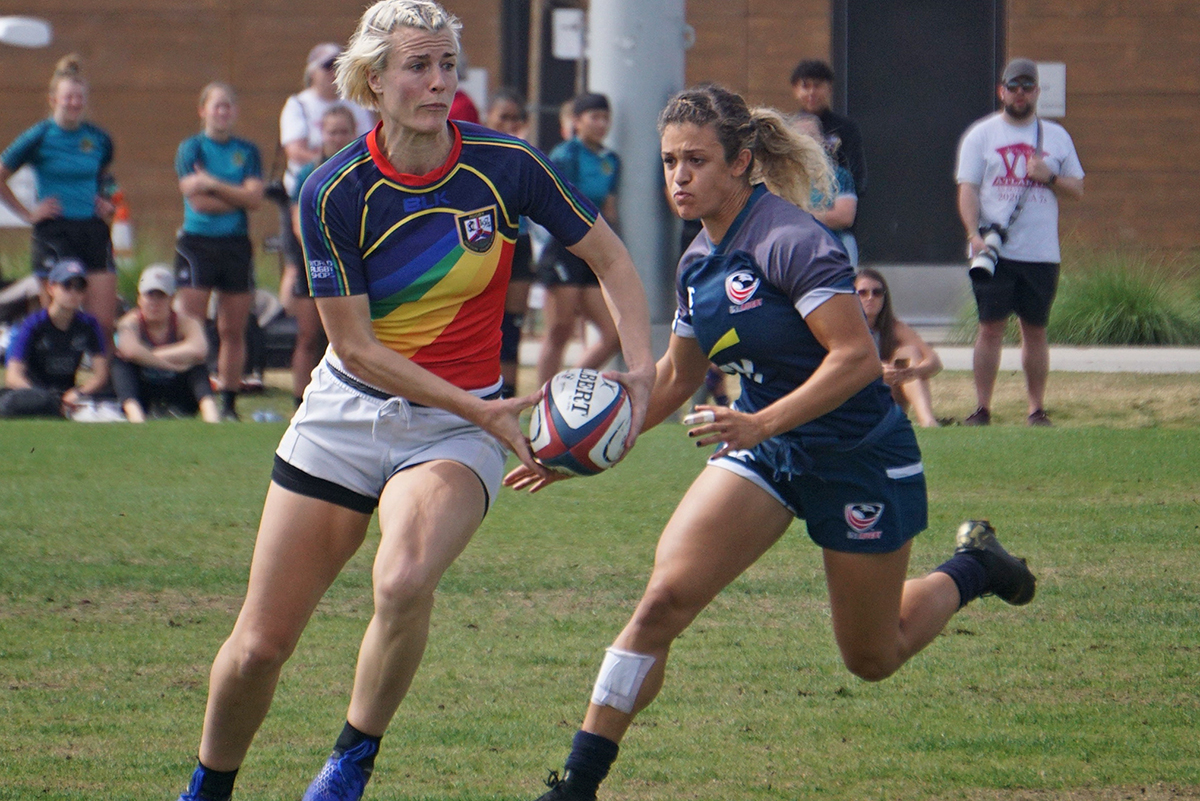
Meanwhile, the Stars defeated ORSU 21-7 to advance to the final, which was held Saturday night inside Dignity Health Sports Park, home to the LA 7s.
“We like to keep it lighthearted so no one feels so much pressure that they crack,” Lawson said of the team vibe heading to the final. “I knew the Stars had great players, and that Kelli [Smith] was another speedster on the other side of the ball that I had to contain. I was nervous. I didn’t want to let anyone down not being able to handle another speedster.”
A great back-and-forth game evolved. Lawson and her opposite wing weren’t able to take the corners, and it wasn’t until a few sideline-to-sideline phases and an Emily Henrich carry through the middle that opportunity arose. The defense collapsed on Henrich, and Olsen sent a skip pass to Lawson, who took off for the try zone. Lawson came off the pitch, as her hip flexor hadn’t fully recovered from a pull earlier in the week. The Falcons added another two tries, while the Stars scored through Smith and Angharad De Smet, and added a conversion through Lucy Packer for the 17-12 final.
“There was no two-phase scoring. Everything required four, five, six phases,” Lawson said. “It’s nice to have people who challenge you. Blowouts are fine and all but you don’t become better rugby players doing that to other teams. You get better when you’re on defense for six phases and you’re exhausted and you’re tested. It forces you to dig deep and then you know how far you can go.”
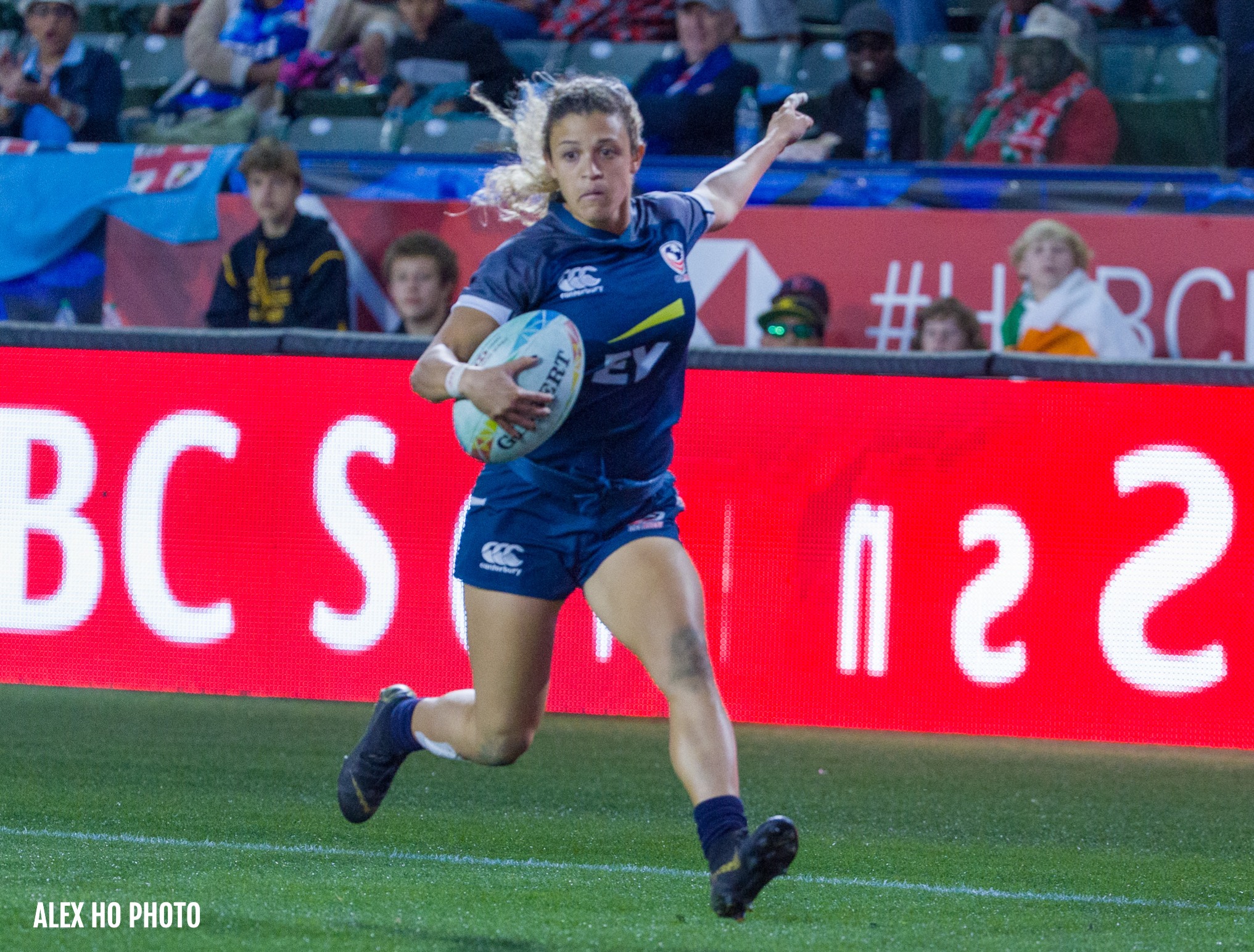
Lawson during the LAI 7s final / Photo: Alex Ho (hoiho.net)
The LAI 7s marked Lawson’s one-year anniversary in the sport, and her grandfather was there to witness her Falcons debut.
“When I first told him that I wanted to play 15s, he got really nervous. He was a lock in 15s and thought I was kind of small, but when I told him that I was playing 7s, he was so elated,” Lawson said. “He was at the game [Saturday] in a South Africa jersey. … My grandparents have always been my biggest supporters in sports.”
The squad is now back in Chula Vista and will have two months to train for the next HSBC World Rugby Sevens Series stop, which will occur in Langford, B.C., Canada on May 2-3. Lawson wants to spend that time building her speed and developing into an explosive playmaker on the outside.
“I want to play on the series; that’s the only real next step from where I’m at now,” Lawson said of goals. “I want to get selected for tour and if that comes in a few months or a year, the goal is to be ready when I do get called. You never know if you’ll get called out immediately but you have to be able to do the job.”
In the meantime, Lawson imagines what that might be like, representing the USA against international competition.
“There are some teams that have really fast players – Australia, Brazil has a wing,” Lawson said. “New Zealand, they have fast players but they’re so elusive. You never know where they’re going to go and they’re so steppy. I think about if I had to play against New Zealand, who would I be in front of and how would I get away from them? How fast or elusive do I need to be to edge Michaela Blyde or Stacey Fluhler? I think Naya [Tapper] has done a great job of figuring that out, using her fend to create spacing.
“It’s all happened so fast,” Lawson reflected on the past year. “When I started I didn’t even know if I’d make the Surfers’ 7s team, and then it was: You’re on the team, now it’s nationals. You won nationals and now get ready for camp. Now you’re a resident; this is your full-time job and you’re representing your country. This is everything you wanted and hoped for and dreamed for. … I’m a very inpatient person so I wouldn’t have it any other way.”
#KaylaLawson USA7s USAFalcons #SanDiego
